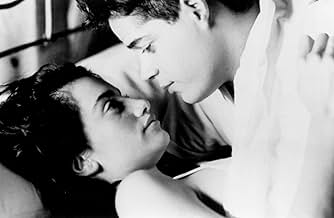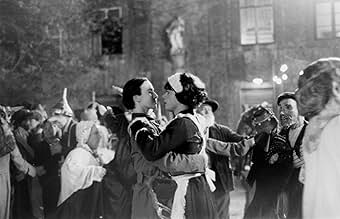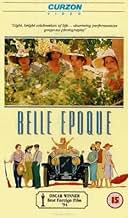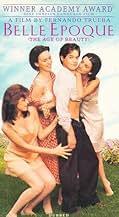NOTE IMDb
7,1/10
12 k
MA NOTE
En 1931, un déserteur espagnol se réfugie dans une ferme isolée jusqu'au jour où les quatre filles du fermier lui rendent visite et il tombe amoureux de chacune d'entre elles.En 1931, un déserteur espagnol se réfugie dans une ferme isolée jusqu'au jour où les quatre filles du fermier lui rendent visite et il tombe amoureux de chacune d'entre elles.En 1931, un déserteur espagnol se réfugie dans une ferme isolée jusqu'au jour où les quatre filles du fermier lui rendent visite et il tombe amoureux de chacune d'entre elles.
- Réalisation
- Scénario
- Casting principal
- Récompensé par 1 Oscar
- 25 victoires et 15 nominations au total
Joan Potau
- Paco
- (as Juan Potau)
Avis à la une
8=G=
"Belle Epoque" is a light-hearted comedy romp which tells of the goings-on at a Spanish villa (circa 1931) involving a patriarch, his four beautiful and amorous daughters, and a wayward young man who can't say "no". Fanciful, warm, fun, and sexy, this Oscar winning film flows like honey as it aims for the heart, not the crotch or head, and hits the mark. Most likely to be appreciated by more seasoned viewers with an interest in Europics. (A-)
Note - This film has considerable dialogue making for significant subtitle reading for non-Spanish speakers.
Note - This film has considerable dialogue making for significant subtitle reading for non-Spanish speakers.
10Johnny B
Belle Epoque is one of those movies you don't see every weekend at the theatre. It is a film set in a certain age (in this case: Spain during the times of the civil war), where the age itself is not very important, but it effects the way the story evolves. The best thing of all in this film is the acting and the comedy. The farce is excellent - hardly ever seen a film with such intelligent humourism. The first time I saw the film was in Spanish and I laughed my guts out (even though I do not know Spanish a lot ). The story too is not too complicated and at the same time it is not at all banal. The highlight of the film, in my opinion, is when the wife of Manolo goes to visit him and starts singing an aria from some opera. Some of the comic highlights of this movie are when Rojio is asked to try her mother-in-law -to-be's wedding dress and when Juanito enters her bed. The best quote from the film is Clara's: "A Woman cannot stay without a man, especially at night." Anyway, just about everything about this movie is great. Well, in short, WATCH IT
Comical (farce at times), deeply human movie about an army deserter who meets up with a kindly, old, artistic gent who offers him refuge. The deserter is packed up and ready to go, until the artist's four beautiful daughters arrive. This sets in motion a plot that will keep you laughing, dialogue that will keep you thinking and characters that will keep you entertained. The humor is not forced and the chuckle is at life's absurdities, politics, most of all, human nature. Momma's entrance into the story is unique and melodic, to say the least. The movie is kind of kooky and not a by-the-numbers flick, and a satisfying watch. Sidebar: It did get the Oscar nod for Best Foreign Film.
Fernando Trueba's enchanting 'Belle Epoque' is a delightful little 'folktale' that is lyrical, sensual, hilarious, whimsical and human. Azcona's cleverly written screenplay is rich with wit, sarcasm and history. In addition to that the film also looks beautiful and authentic (compared to the overload of glossy look in a majority of films).
Set in a country farm, it tells the story of a young soldier (Jorge Sanz), a deserter, who escapes and finds solace at Manolo's (Fernando Fernán Gómez) house where he falls for his four daughters, the widow (Miriam Díaz-Aroca), the lesbian (Ariadna Gil), the belle (Maribel Verdú) and the virgin (Penélope Cruz). On the surface the story sounds may sound odd but it's splendidly quirky. It successfully avoids the 'cliches' that are so evident in many European films that make it to the so-called international platform begging for a best foreign language Oscar (even though 'Belle Epoque' won it in 1993).
The storytelling here, for one, feels very natural and not one scene looks forced. The editing smoothens things finely and the score is first rate as it gives 'Belle Epoque' that final whimsical touch.
All the actors do a superb job. Fernando Fernán Gómez is very likable as the patron of the family. Miriam Díaz-Aroca, Ariadna Gil, Maribel Verdú and Penélope Cruz are excellent as the stunning looking daughters. Jorge Sanz is great as the naive hero and Gabino Diego provides wonderful comic relief.
In the end, 'Belle Epoque' is a delicious combination of humour, music, sex, romance, self-discovery and adventure, a celebration of life itself.
Set in a country farm, it tells the story of a young soldier (Jorge Sanz), a deserter, who escapes and finds solace at Manolo's (Fernando Fernán Gómez) house where he falls for his four daughters, the widow (Miriam Díaz-Aroca), the lesbian (Ariadna Gil), the belle (Maribel Verdú) and the virgin (Penélope Cruz). On the surface the story sounds may sound odd but it's splendidly quirky. It successfully avoids the 'cliches' that are so evident in many European films that make it to the so-called international platform begging for a best foreign language Oscar (even though 'Belle Epoque' won it in 1993).
The storytelling here, for one, feels very natural and not one scene looks forced. The editing smoothens things finely and the score is first rate as it gives 'Belle Epoque' that final whimsical touch.
All the actors do a superb job. Fernando Fernán Gómez is very likable as the patron of the family. Miriam Díaz-Aroca, Ariadna Gil, Maribel Verdú and Penélope Cruz are excellent as the stunning looking daughters. Jorge Sanz is great as the naive hero and Gabino Diego provides wonderful comic relief.
In the end, 'Belle Epoque' is a delicious combination of humour, music, sex, romance, self-discovery and adventure, a celebration of life itself.
This awesome film has a simple plot : A man , four women and a lot of romance . It deals with a Spanish soldier named Fernando (Jorge Sanz) deserts from the army in 1931, at the beginning of Spanish Republic , a time of optimism and promise and previous Civil War (1936-1939) . Fernando flees only to find himself detained by a pair of local Guardia Civil . The hearty young boy and main character, well portrayed by Jorge Sanz (still one of Spain's most promising young actors), breaks outs and soon is befriended a lonely ,elderly man called Manolo (Fernando Fernan Gomez) in a little village . Problems arise when the Manolo's four daughters (Penelope Cruz , Miriam Diaz Aroca , Maribel Verdu , Ariadna Gil) come to visit their daddy and the soldier quickly enchanted falls in love with each of them . Fernando likes all of them and they like him , so he must decide which one to love , or Rocio, Violeta, Clara and Luz .
Earthy comedy with historical and romantic elements ; including enjoyable performances , adequate set design and delightfully shot . ¨Belle Epoque" , ¨The age of beauty¨ results to be other of the innumerable stories to deal with youthful love , being developed in mirth , lively and vital style . An agreeable story in which an ex-soldier escapes and discovers the opposite sex on the way , it is plenty of amusing moments , moving feelings and fun finale . It is a light , wistful romantic comedy , easy to watch , and easier to love . A very pleasant romantic comedy plenty of humor , emotion , sensitive scenes and mayhem . "Belle Epoque" is Trueba's return to top form, with an intelligent and engaging script which uses amusing situations to give us a good movie in a high sense and intimate sensitivity and that kept me entertained for the almost two hours of duration . It is well set and is as marvelously filmed as it is written and acted . This is one of those rare gems that does not stray from its purpose - to be a celebration of love and romance and humorous tale of a young boy controlled by his libido . Oscarized director Fernando Trueba , also writes the interesting script along with prestigious screenwriters as Jose Luis Garcia Sanchez and Rafael Azcona , Luis Garcia Berlanga's ordinary . Filmed in his usual formal and luxurious style , without leaving a trace the joyful themes , in terms of dramatic and narrative excitement . The film is light and never somber, no small accomplishment from Fernando Trueba and his team . Very good secondary cast formed by Spanish familiar faces such as Gabino Diego , Agustin Gonzalez , Maria Galiana , Juan Jose Otegui , Mary Carmen Ramirez , Chus Lampreave : Almodovar's usual and the French Michel Galabru . Colorful and evocative cinematography by Jose Luis Alcaine , one of the best Spanish cameramen . Gorgeous exteriors filmed in Portugal ; Fernando Trueba shot the movie in Portugal for two main reasons : 1) he couldn't find any place similar to what he had in mind in Spain and 2) the use of that Portuguese location allowed him to empathize the tone of fable the story required . Jolly as well as sensitive musical score by Antoine Duhamel , including Non-Original music by Pablo Sorozábal from opera "La Taberna del Puerto" and some catching song as when Gabino comes to serenade Rocìo, he sings "Las Mañanitas" which in México is used to celebrate a birthday .
This simple , attractive and delightful motion picture was well directed by Oscar-winning director Fernando Trueba , as the flick is entertaining and well worth your time . His first success was Ópera Prima (1980) following the style of the "Madrid comedy". Trueba had major success with Sé Infiel y No mires Quién (1985) also known as : Be Wanton and Tread No Shame , starting a longer collaboration with the producer Andrés Vicente Gómez . He went on directing numerous successes such as Coarse salt , Too Much , Year of Enlightment , Milagro de Candeal , Niña De Tus Ojos or The Girl of Your Dreams , Calle 54 , Embrujo De Shanghai , Chico and Rita and recently : The Artist and the Model. The multi-award winner in Spain Fernando Trueba was President of the Spanish Academy of Motion Picture Arts and he received the 1994 Oscar for Best Foreign Film to Belle Epoque (1992)and when accepting his Academy Award for Best Foreign Language Film, director (Fernando Trueba) said: "I would like to believe in God in order to thank him for this prize, but I only believe in (Billy Wilder), so... Thank you, Mr. Wilder!". Wilder himself reportedly phoned Trueba a few days later for acknowledgment and told him: "Hello Fernando, I'm God".
Earthy comedy with historical and romantic elements ; including enjoyable performances , adequate set design and delightfully shot . ¨Belle Epoque" , ¨The age of beauty¨ results to be other of the innumerable stories to deal with youthful love , being developed in mirth , lively and vital style . An agreeable story in which an ex-soldier escapes and discovers the opposite sex on the way , it is plenty of amusing moments , moving feelings and fun finale . It is a light , wistful romantic comedy , easy to watch , and easier to love . A very pleasant romantic comedy plenty of humor , emotion , sensitive scenes and mayhem . "Belle Epoque" is Trueba's return to top form, with an intelligent and engaging script which uses amusing situations to give us a good movie in a high sense and intimate sensitivity and that kept me entertained for the almost two hours of duration . It is well set and is as marvelously filmed as it is written and acted . This is one of those rare gems that does not stray from its purpose - to be a celebration of love and romance and humorous tale of a young boy controlled by his libido . Oscarized director Fernando Trueba , also writes the interesting script along with prestigious screenwriters as Jose Luis Garcia Sanchez and Rafael Azcona , Luis Garcia Berlanga's ordinary . Filmed in his usual formal and luxurious style , without leaving a trace the joyful themes , in terms of dramatic and narrative excitement . The film is light and never somber, no small accomplishment from Fernando Trueba and his team . Very good secondary cast formed by Spanish familiar faces such as Gabino Diego , Agustin Gonzalez , Maria Galiana , Juan Jose Otegui , Mary Carmen Ramirez , Chus Lampreave : Almodovar's usual and the French Michel Galabru . Colorful and evocative cinematography by Jose Luis Alcaine , one of the best Spanish cameramen . Gorgeous exteriors filmed in Portugal ; Fernando Trueba shot the movie in Portugal for two main reasons : 1) he couldn't find any place similar to what he had in mind in Spain and 2) the use of that Portuguese location allowed him to empathize the tone of fable the story required . Jolly as well as sensitive musical score by Antoine Duhamel , including Non-Original music by Pablo Sorozábal from opera "La Taberna del Puerto" and some catching song as when Gabino comes to serenade Rocìo, he sings "Las Mañanitas" which in México is used to celebrate a birthday .
This simple , attractive and delightful motion picture was well directed by Oscar-winning director Fernando Trueba , as the flick is entertaining and well worth your time . His first success was Ópera Prima (1980) following the style of the "Madrid comedy". Trueba had major success with Sé Infiel y No mires Quién (1985) also known as : Be Wanton and Tread No Shame , starting a longer collaboration with the producer Andrés Vicente Gómez . He went on directing numerous successes such as Coarse salt , Too Much , Year of Enlightment , Milagro de Candeal , Niña De Tus Ojos or The Girl of Your Dreams , Calle 54 , Embrujo De Shanghai , Chico and Rita and recently : The Artist and the Model. The multi-award winner in Spain Fernando Trueba was President of the Spanish Academy of Motion Picture Arts and he received the 1994 Oscar for Best Foreign Film to Belle Epoque (1992)and when accepting his Academy Award for Best Foreign Language Film, director (Fernando Trueba) said: "I would like to believe in God in order to thank him for this prize, but I only believe in (Billy Wilder), so... Thank you, Mr. Wilder!". Wilder himself reportedly phoned Trueba a few days later for acknowledgment and told him: "Hello Fernando, I'm God".
Le saviez-vous
- AnecdotesWhen accepting his Academy Award for Best Foreign Language Film, director (Fernando Trueba) said: "I would like to believe in God in order to thank him for this prize, but I only believe in (Billy Wilder), so... Thank you, Mr. Wilder!". Wilder himself reportedly phoned Trueba a few days later for acknowledgment and told him: "Hello Fernando, I'm God".
- GaffesAmalia sings "En un pais de fábula" from Pablo Sorozábal's zarzuela "La tabernera del puerto". The situation of the movie is in early 1930s, whereas this zarzuela was first staged in 1936.
- Bandes originalesEn un país de fábula
(from La tabernera del puerto)
Written by Pablo Sorozábal (as Pablo Sorozabal), Guillermo Fernández Shaw and Federico Romero
Performed by Mary Carmen Ramírez
Meilleurs choix
Connectez-vous pour évaluer et suivre la liste de favoris afin de recevoir des recommandations personnalisées
- How long is Belle Epoque?Alimenté par Alexa
Détails
- Date de sortie
- Pays d’origine
- Site officiel
- Langues
- Aussi connu sous le nom de
- Belle Epoque
- Lieux de tournage
- Arruda dos vinhos, Lisbonne, Portugal(Quinta do Bulhaco: Manolo's estate at 38°56'55"N, 9°03'51"W)
- Sociétés de production
- Voir plus de crédits d'entreprise sur IMDbPro
Box-office
- Montant brut aux États-Unis et au Canada
- 5 418 216 $US
- Montant brut mondial
- 5 418 502 $US
- Durée1 heure 49 minutes
- Mixage
- Rapport de forme
- 2.35 : 1
Contribuer à cette page
Suggérer une modification ou ajouter du contenu manquant

Lacune principale
By what name was Belle époque (1992) officially released in Canada in French?
Répondre



































